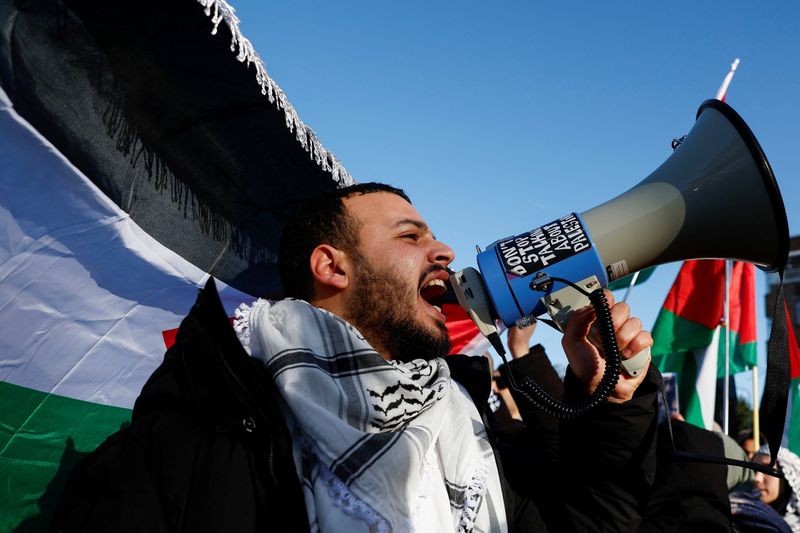
©Reuters. A person shouts slogans during a pro-Palestinian demonstration outside the International Court of Justice (ICJ) as judges rule on emergency measures against Israel following South Africa’s accusations that Israel’s military operation in Gaza is a statistic
2/5
THE HAGUE (Reuters) – The International Court of Justice (ICJ) on Friday ordered Israel to act to prevent acts of genocide as it wages war against Hamas militants in the Gaza Strip, but did not call for an immediate ceasefire .
The United Nations’ main tribunal for dealing with disputes between states has ruled on a lawsuit brought by South Africa.
Here are the key points of the decision.
WHAT DID THE COURT DECIDE?
The court ordered Israel to refrain from any acts that would fall under the Genocide Convention and to ensure that its troops do not commit acts of genocide in Gaza.
“At least some of the acts and omissions alleged by South Africa to have been committed by Israel in Gaza appear likely to fall within the provisions of the (Genocide) Convention,” the judges said.
The ruling required Israel to prevent and punish any public incitement to commit genocide against Palestinians in Gaza and to preserve evidence relating to any allegations of genocide in the area.
Israel must also take measures to improve the humanitarian situation of Palestinian civilians in the enclave.
However, the court did not call for an immediate ceasefire in Gaza, which Israel says would allow Hamas militants to regroup and launch new attacks on the country.
The court also said it was “gravely concerned” about the fate of hostages held in Gaza and called on Hamas and other armed groups to release them immediately and unconditionally.
DID ALL THE JUDGES SUPPORT THE SENTENCE?
A majority of at least 15 of 17 justices voted in favor of imposing the so-called provisional measures, including the court’s chief justice, Joan Donoghue of the United States.
Justice Julia Sebutinde of Uganda was the only one to vote against all six measures adopted by the court. Israel’s ad hoc judge, Aharon Barak, voted against four measures.
“I voted for it in the hope that the measure will help reduce tensions and discourage harmful rhetoric,” Barak wrote, detailing his vote in favor of an order that Israel punish incitement to genocide.
WHAT HAPPENS NOW?
Israel is required to submit a report to the court on the measures it has taken to comply with the orders within a month of the ruling. The court will examine the merits of the case in detail, a process that could take years.
Although the ICJ’s decisions are final and without appeal, the court has no way to enforce them.
WHAT IS THE GENOCIDE CONVENTION?
The 1948 Genocide Convention, enacted following the mass extermination of Jews during the Nazi Holocaust, defines genocide as “acts committed with intent to destroy, in whole or in part, a national, ethnic, racial or religious”.
Acts of genocide include killing members of the group, causing serious physical or mental harm to members of the group, and the deliberate infliction of living conditions intended to bring about the total or partial destruction of the group.
WHAT WAS THE REACTION TO THE ICJ’S JUDGMENT?
Israeli Prime Minister Benjamin Netanyahu said the genocide charge leveled against Israel was “outrageous” and said it would do whatever it takes to defend itself. Israel has an “unwavering commitment” to international law, he said.
Defense Minister Yoav Gallant expressed dismay that the ICJ did not fully reject South Africa’s petition, while National Security Minister Itamar Ben-Gvir appeared to mock the ruling with a Yiddish-style insult on the platform of social media X: “Hague Shmague”.
Palestinians largely welcomed Friday’s ruling.
“The judges of the International Court of Justice evaluated the facts and the law, they decided in favor of humanity and international law,” Palestinian Foreign Minister Riyad al-Maliki said.
Sami Abu Zuhri, a senior Hamas official, said the ruling helped isolate Israel on the world stage.
South Africa, a long-time supporter of the Palestinian cause, welcomed the International Court of Justice ruling, and President Cyril Ramaphosa said he expected Israel to abide by its ruling that it takes measures to prevent genocide against the people of Gaza. (This story has been refiled to correct a typo in the headline)